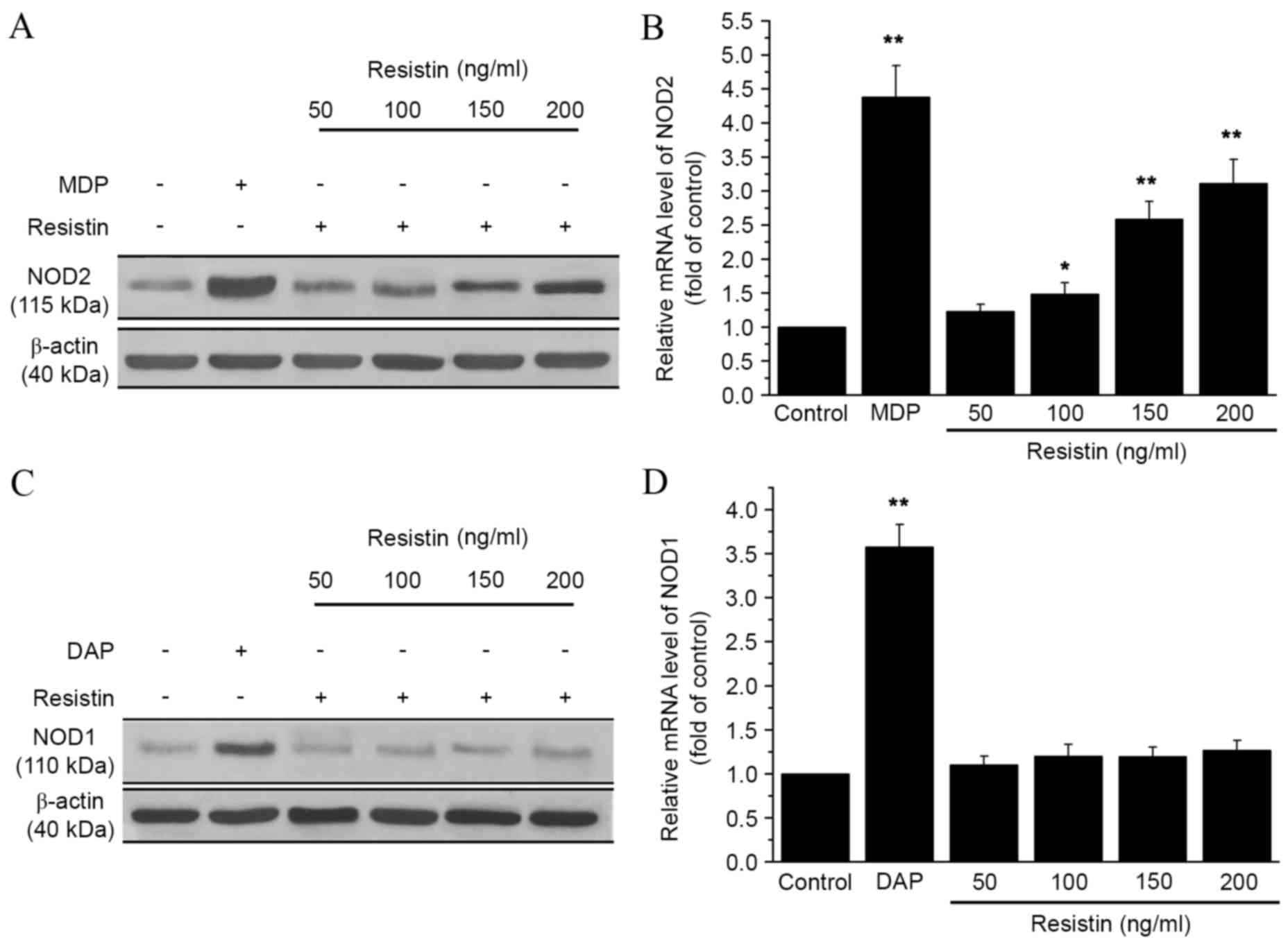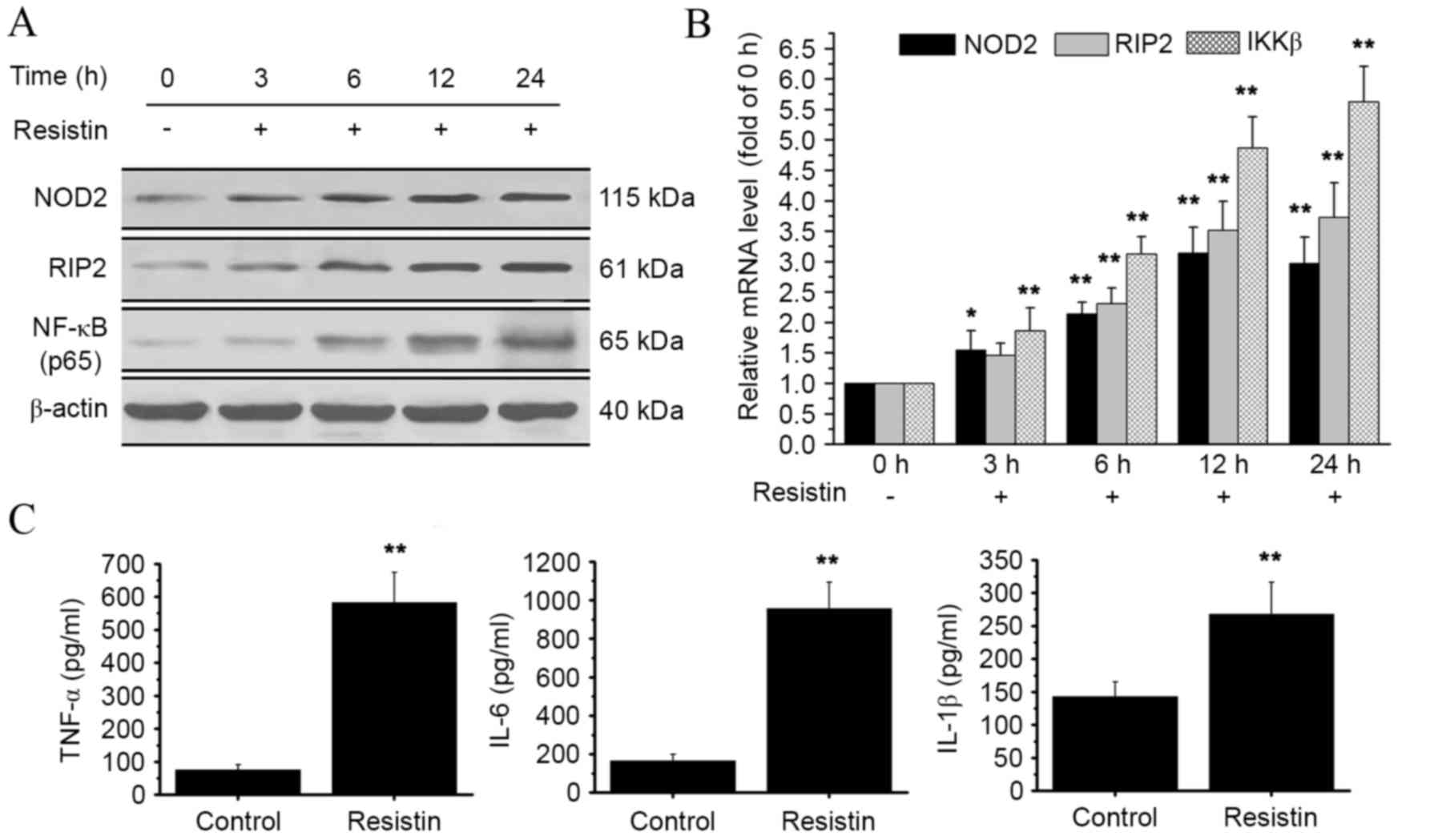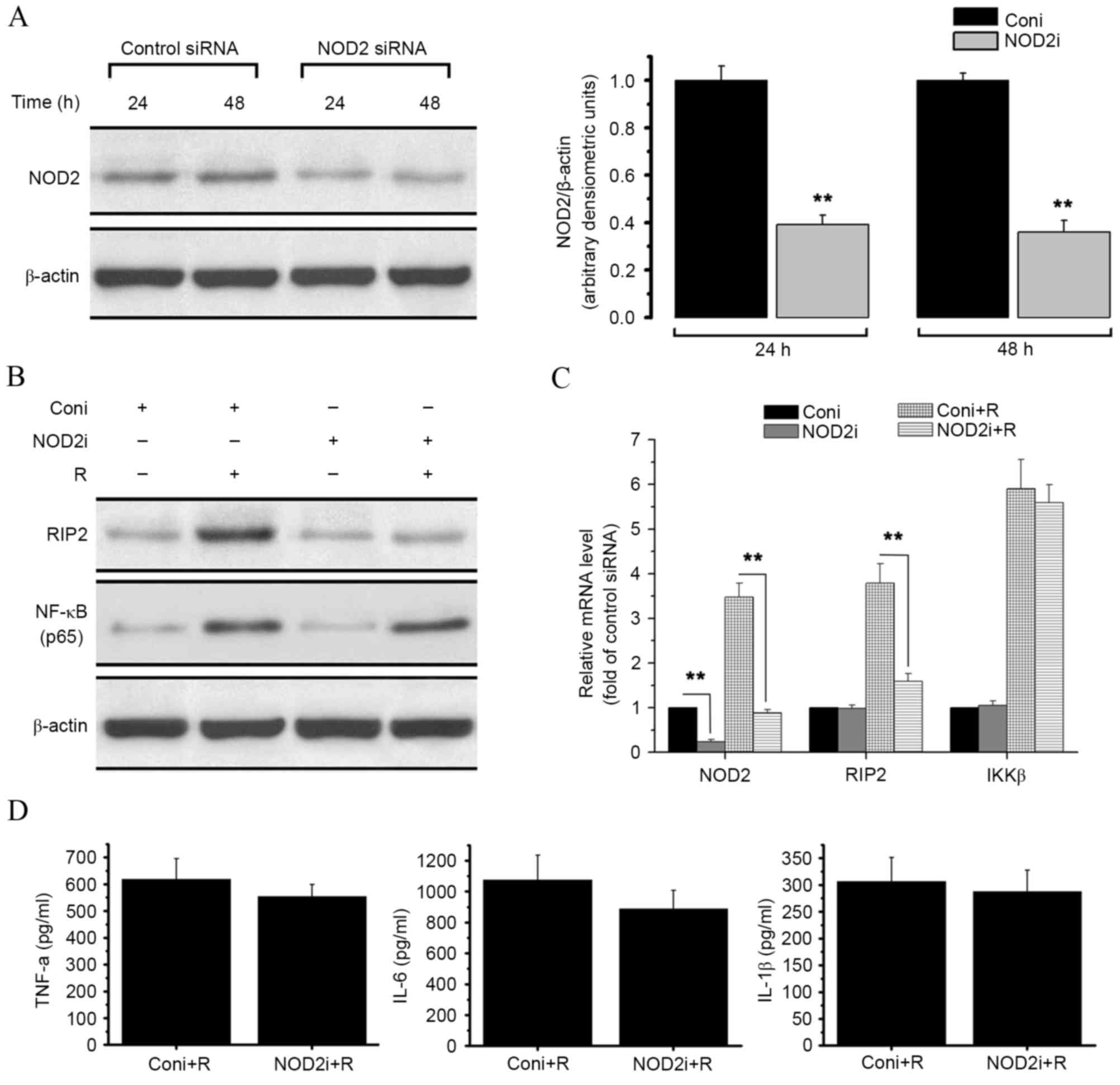|
1
|
Kahn BB and Flier JS: Obesity and insulin
resistance. J Clin Invest. 106:473–481. 2000. View Article : Google Scholar : PubMed/NCBI
|
|
2
|
Wellen KE and Hotamisligil GS:
Obesity-induced inflammatory changes in adipose tissue. J Clin
Invest. 112:1785–1788. 2003. View
Article : Google Scholar : PubMed/NCBI
|
|
3
|
Zhao L, Kwon MJ, Huang S, Lee JY, Fukase
K, Inohara N and Hwang DH: Differential modulation of Nods
signaling pathways by fatty acids in human colonic epithelial
HCT116 cells. J Biol Chem. 282:11618–11628. 2007. View Article : Google Scholar : PubMed/NCBI
|
|
4
|
Ferroni P, Basili S, Falco A and Davì G:
Inflammation, insulin resistance, and obesity. Curr Atheroscler
Rep. 6:424–431. 2004. View Article : Google Scholar : PubMed/NCBI
|
|
5
|
Steinberg GR: Inflammation in obesity is
the common link between defects in fatty acid metabolism and
insulin resistance. Cell Cycle. 6:888–894. 2007. View Article : Google Scholar : PubMed/NCBI
|
|
6
|
Heilbronn LK and Campbell LV: Adipose
tissue macrophages, low grade inflammation and insulin resistance
in human obesity. Curr Pharm Des. 14:1225–1230. 2008. View Article : Google Scholar : PubMed/NCBI
|
|
7
|
Mooradian AD: Obesity: A rational target
for managing diabetes mellitus. Growth Horm IGF Res. 11:(Suppl A).
S79–S83. 2001. View Article : Google Scholar : PubMed/NCBI
|
|
8
|
Patel SD, Rajala MW, Rossetti L, Scherer
PE and Shapiro L: Disulfide-dependent multimeric assembly of
resistin family hormones. Science. 304:1154–1158. 2004. View Article : Google Scholar : PubMed/NCBI
|
|
9
|
Lin J, Choi YH, Hartzell DL, Li C,
Della-Fera MA and Baile CA: CNS melanocortin and leptin effects on
stearoyl-CoA desaturase-1 and resistin expression. Biochem Biophys
Res Commun. 311:324–328. 2003. View Article : Google Scholar : PubMed/NCBI
|
|
10
|
Strausberg RL, Feingold EA, Grouse LH,
Derge JG, Klausner RD, Collins FS, Wagner L, Shenmen CM, Schuler
GD, Altschul SF, et al: Generation and initial analysis of more
than 15,000 full-length human and mouse cDNA sequences. Proc Natl
Acad Sci USA. 99:16899–16903. 2002. View Article : Google Scholar : PubMed/NCBI
|
|
11
|
Mojiminiyi O and Abdella N: Associations
of resistin with inflammation and insulin resistance in patients
with type 2 diabetes mellitus. Scand J Clin Lab Invest. 67:215–225.
2007. View Article : Google Scholar : PubMed/NCBI
|
|
12
|
Muse ED, Obici S, Bhanot S, Monia BP,
McKay RA, Rajala MW, Scherer PE and Rossetti L: Role of resistin in
diet-induced hepatic insulin resistance. J Clin Invest.
114:232–239. 2004. View Article : Google Scholar : PubMed/NCBI
|
|
13
|
Banerjee RR, Rangwala SM, Shapiro JS, Rich
AS, Rhoades B, Qi Y, Wang J, Rajala MW, Pocai A, Scherer PE, et al:
Regulation of fasted blood glucose by resistin. Science.
303:1195–1198. 2004. View Article : Google Scholar : PubMed/NCBI
|
|
14
|
Reilly MP, Lehrke M, Wolfe ML, Rohatgi A,
Lazar MA and Rader DJ: Resistin is an inflammatory marker of
atherosclerosis in humans. Circulation. 111:932–939. 2005.
View Article : Google Scholar : PubMed/NCBI
|
|
15
|
Senolt L, Housa D, Vernerová Z, Jirásek T,
Svobodová R, Veigl D, Anderlová K, Müller-Ladner U, Pavelka K and
Haluzík M: Resistin in rheumatoid arthritis synovial tissue,
synovial fluid and serum. Ann Rheum Dis. 66:458–463. 2007.
View Article : Google Scholar : PubMed/NCBI
|
|
16
|
Filková M, Haluzík M, Gay S and Šenolt L:
The role of resistin as a regulator of inflammation: Implications
for various human pathologies. Clin Immunol. 133:157–170. 2009.
View Article : Google Scholar : PubMed/NCBI
|
|
17
|
Bokarewa M, Nagaev I, Dahlberg L, Smith U
and Tarkowski A: Resistin, an adipokine with potent proinflammatory
properties. J Immunol. 174:5789–5795. 2005. View Article : Google Scholar : PubMed/NCBI
|
|
18
|
Wellen KE and Hotamisligil GS:
Obesity-induced inflammatory changes in adipose tissue. J Clin
Invest. 112:1785–1788. 2003. View
Article : Google Scholar : PubMed/NCBI
|
|
19
|
Olefsky JM and Glass CK: Macrophages,
inflammation, and insulin resistance. Annu Rev Physiol. 72:219–246.
2010. View Article : Google Scholar : PubMed/NCBI
|
|
20
|
Silswal N, Singh AK, Aruna B, Mukhopadhyay
S, Ghosh S and Ehtesham NZ: Human resistin stimulates the
pro-inflammatory cytokines TNF-alpha and IL-12 in macrophages by
NF-kappaB-dependent pathway. Biochem Biophys Res Commun.
334:1092–1101. 2005. View Article : Google Scholar : PubMed/NCBI
|
|
21
|
Tarkowski A, Bjersing J, Shestakov A and
Bokarewa MI: Resistin competes with lipopolysaccharide for binding
to toll-like receptor 4. J Cell Mol Med. 14:1419–1431. 2010.
View Article : Google Scholar : PubMed/NCBI
|
|
22
|
Lee S, Lee HC, Kwon YW, Lee SE, Cho Y, Kim
J, Lee S, Kim JY, Lee J, Yang HM, et al: Adenylyl
cyclase-associated protein 1 is a receptor for human resistin and
mediates inflammatory actions of human monocytes. Cell Metab.
19:484–497. 2014. View Article : Google Scholar : PubMed/NCBI
|
|
23
|
Boström EA, Svensson M, Andersson S,
Jonsson IM, Ekwall AK, Eisler T, Dahlberg LE, Smith U and Bokarewa
MI: Resistin and insulin/insulin-like growth factor signaling in
rheumatoid arthritis. Arthritis Rheum. 63:2894–2904. 2011.
View Article : Google Scholar : PubMed/NCBI
|
|
24
|
Sánchez-Solana B, Laborda J and Baladron
V: Mouse resistin modulates adipogenesis and glucose uptake in
3T3-L1 preadipocytes through the ROR1 receptor. Mol Endocrinol.
26:110–127. 2012. View Article : Google Scholar : PubMed/NCBI
|
|
25
|
Inohara N, Koseki T, Lin J, del Peso L,
Lucas PC, Chen FF, Ogura Y and Núñez G: An induced proximity model
for NF-kappa B activation in the Nod1/RICK and RIP signaling
pathways. J Biol Chem. 275:27823–27831. 2000.PubMed/NCBI
|
|
26
|
Tamrakar AK, Schertzer JD, Chiu TT, Foley
KP, Bilan PJ, Philpott DJ and Klip A: NOD2 activation induces
muscle cell-autonomous innate immune responses and insulin
resistance. Endocrinology. 151:5624–5637. 2010. View Article : Google Scholar : PubMed/NCBI
|
|
27
|
Zhao L, Hu P, Zhou Y, Purohit J and Hwang
D: NOD1 activation induces proinflammatory gene expression and
insulin resistance in 3T3-L1 adipocytes. Am J Physiol Endocrinol
Metab. 301:E587–E598. 2011. View Article : Google Scholar : PubMed/NCBI
|
|
28
|
Schertzer JD and Klip A: Give a NOD to
insulin resistance. Am J Physiol Endocrinol Metab. 301:E585–E586.
2011. View Article : Google Scholar : PubMed/NCBI
|
|
29
|
Livak KJ and Schmittgen TD: Analysis of
relative gene expression data using real-time quantitative PCR and
the 2(−Delta Delta C(T)) Method. Methods. 25:402–408. 2001.
View Article : Google Scholar : PubMed/NCBI
|
|
30
|
He W, Wang ML, Jiang HQ, Steppan CM, Shin
ME, Thurnheer MC, Cebra JJ, Lazar MA and Wu GD: Bacterial
colonization leads to the colonic secretion of RELMbeta/FIZZ2, a
novel goblet cell-specific protein. Gastroenterology.
125:1388–1397. 2003. View Article : Google Scholar : PubMed/NCBI
|
|
31
|
Cho SY, Park SJ, Kwon MJ, Jeong TS, Bok
SH, Choi WY, Jeong WI, Ryu SY, Do SH, Lee CS, et al: Quercetin
suppresses proinflammatory cytokines production through MAP kinases
and NF-kappaB pathway in lipopolysaccharide-stimulated macrophage.
Mol Cell Biochem. 243:153–160. 2003. View Article : Google Scholar : PubMed/NCBI
|
|
32
|
Karin M and Delhase M: The I kappa B
kinase (IKK) and NF-kappa B: Key elements of proinflammatory
signalling. Semin Immunol. 12:85–98. 2000. View Article : Google Scholar : PubMed/NCBI
|


















